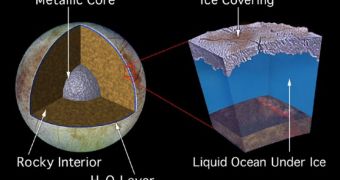Of all the bodies in the solar system, with the exception of Earth, the Jovian moon Europe is widely considered to be the second-most likely to support basic lifeforms. Now, a new study shows that the liquid water underneath the moon's icy surface may be too acidic for life to appear or endure there.
Astronomers believe that the moon has a liquid ocean at its core, underneath a very thick crust of ice. The body's arrangement is very similar to that of Enceladus, a large, ice-covered moon orbiting Saturn.
According to a report presented by Astrobiology Magazine, it could be that several types of chemicals are constantly draining down through the ices, and into the ocean. These compounds could be making the water very acidic, perhaps too dangerous even for Earth's harshest extremophiles.
The process may be very slow, since the water is believed to lie about 100 miles (160 kilometers) underneath the surface, but it has been going on for hundreds of millions of years. By now, Europa's waters may be filled with acid, say experts at the University of South Florida (USF).
What is even more interesting is that recent studies have demonstrated that the ocean may contain oxygen, brought under the ice through a series of complex processes. The discovery made many believe that Europa may indeed support extraterrestrial life.
But Europa's acidity level “is probably not friendly to life – it ends up messing with things like membrane development, and it could be hard building the large-scale organic polymers,” expert Matthew Pasek believes. He is an astrobiologist at USF.
The recent analysis found oxidants on the surface of the Jovian moon. This class of chemicals is able to accept electrons from other substances, and therefore turn things acidic. Usually, their actions are counterbalanced by reductants, a class of elements including hydrogen and carbon.
Common substances such as carbon dioxide and water are the results of reactions between oxidants and reductants, chemists explain. In the new study, experts detected large amounts of oxidants such as oxygen and hydrogen peroxide on the surface of Europa.
At this point, it is believed that these chemicals are produced by intense radiations emitted by the gas giant Jupiter. These high-energy particles interact with ice and produce strong oxidants. The latter may then infiltrate the ice, and make their way into the liquid water underneath.
Details of the new study were published in the January 27 online issue of the esteemed scientific journal Astrobiology.
But not all scientists are convinced that a highly-acidic environment would destroy life on Europa. Some believe that extremophile bacteria – found on Earth living in volcanic caldera, under miles of ice and in highly radioactive environments – prove that life can adapt to nearly all conditions.

 14 DAY TRIAL //
14 DAY TRIAL //